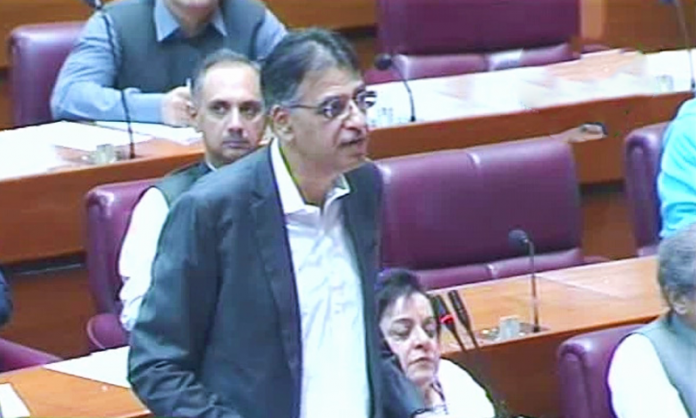–Former finance minister Asad Umar criticises budget, says unfair to tax sugar and ghee
–Umar says recent arrests will hamper progress if there are ulterior motives to them
ISLAMABAD: Addressing the assembly session, the Pakistan Tehreek-e-Insaf (PTI) stalwart and National Assembly’s Standing Committee on Finance Chairman Asad Umar expressed reservations on the first federal budget presented by his party.
He said that tax on sugar has been raised despite the fact that the price of sugar had already risen at an alarming rate, adding that it is unfair to further burden the common man. The former finance minister called for an investigation into the price hike of sugar and said that the government should withdraw the tax on sugar.
Questioning why essential items were taxed, he urged Adviser to Prime Minister on Finance Abdul Hafeez Sheikh to reverse the taxes on edible oil and ghee, adding that the total receivables after an increase in the taxes on sugar, oil and ghee are minimal.
Responding to Zardari’s statement about arrests taking the country backwards, he said that if the arrests are for political victimisation then are undoubtedly wrong but if the arrests are made for holding the corrupt accountable then there is nothing wrong with that because it is the responsibility of the parliamentarians to establish a system of reward and punishment in line with the Constitution.
“People should be held accountable if they do any wrong,” he said.
Explaining the federal budget, the former finance minister said that the incumbent government inherited massive foreign debt courtesy of the previous governments. He added that the introduction of the finance bill was one of the solutions to the issues the country is facing.
“When PTI came to power, our foreign reserves were nearly empty, therefore, we introduced the bill to reduce the current account deficit,” he said, adding that the government is devising policies to increase exports to reduce the foreign debt.
He said that the current account deficit of $2.035 billion was reduced by 70 per cent in the last three months before he was removed as the finance minister.
Defending the budget, he said that despite the challenges, the government presented a great budget. He also said that the government is responsible for the maintenance of 200 million people and not just a few multi-billionaires.
He suggested that interest rates must be revised and lowered to invite people to invest in the economy.
Noting that the turnover tax has been increased in the federal budget, he suggested that the government should exclude new investments from the minimum tax in the first five years. He added that balancing, modernisation, rehabilitation and expansion (BMRE) tax credit should be restored.
He also said that the government should revise the Employees Old-Age Benefits Institution (EOBI) pensions to 15 per cent.
The former finance minister suggested that the agriculture sector should be boosted by the government. He further said that federal excise duty (FED) on import of small cars should be reviewed because the middle class is currently going through a tough phase.
Talking about the government’s deal with the International Monetary Fund (IMF), he said that electricity prices, gas prices, tax rates, policy rates of State Bank of Pakistan (SBP) and rupee valuation were discussed with the international lender for an agreement. He said that IMF wanted electricity prices to go up by 50 per cent but the National Electric Power Regulatory Authority (NEPRA) decided a hike of 11 per cent which may go up to 15 per cent.
The former finance minister further said that the international lender wanted the debt accumulated during the tenures of the previous governments to be recovered as well.




